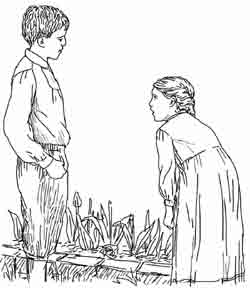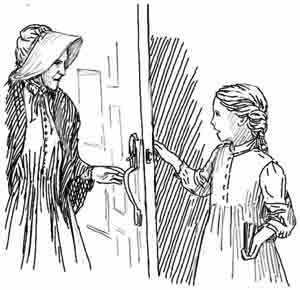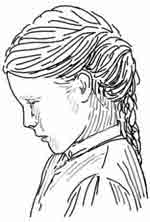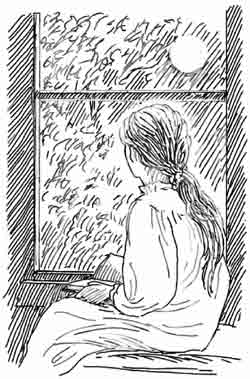The Garden of the Beloved
“There, now you’ve done it,” cried John Cramer to his twin brother, Cornelius, as he arrived breathless at the garden gate. “You weren’t fair a bit in that race, and you ran twice right over Phoebe’s flowerbed, and took the heads off her very best tulips. Oh! won’t she be mad? And here she comes this very minute to look at them!”
“That’s a fact,” said Cornelius, “and I may as well walk right up and ‘face the music,’ and have it over with.” He went slowly up to Phoebe, who was bending in sorrowful surprise over her little tribe of tulips that had been so remorselessly scalped.

“Yes, I did it,” said Cornelius, in dogged response to her look of mute inquiry. “There now, how angry you are. You pretend to be good, and you’re not a bit like that girl in the story of ‘Good Little Jane.’ She would have said right away, ‘Oh, if anyone’s flowers are spoiled, I hope they are mine,’ and she would have been so glad that they were not her brother’s, that she would have been happy as a queen. But you are so selfish, I do believe you are going to cry. You ought to have been called April—it’s just shower, shower, shower all the time. Yes, here it comes,” said he, as two white clouds, with heavy fringes, swept down over those little samples of blue sky, commonly called Phoebe’s eyes. “April showers!” continued he, in a tone of great disgust, to John, who drew nigh.
Phoebe spent a moment trying to swallow something, which, from the effort, might have been the whole range of the Alleghany Mountains. Then, looking up with a smile like a rainbow, she said, “Well, I’m sure I didn’t mean to be selfish, and I am truly glad they are not your flowers, but you know these disappointments come on one sometimes, just like a great cloud, and one can’t help a little rain.” She added, good-naturedly, “Don’t you remember the little rhyme, ‘April showers bring May flowers?’ ”
“I don’t understand you,” said Cornelius. “It would be a funny flower-garden that would spring up under those showers. What do you mean?”
“I’m afraid I can’t explain it very well,” said Phoebe, “but Miss Weston was telling me last Sunday that when any trouble came—big or little—it made every thing gloomy like the clouds on a rainy day. But if we took the cloud patiently, and let the rain come down and soften our hearts, after a while flowers would bud and bloom—fair white flowers—and the Beloved would come down into his garden to gather lilies.”

“What a terribly mixed-up speech that is,” said Cornelius, scornfully. “I don’t believe you have the least idea what you are talking about. Lilies and flowers in one’s heart! What do you mean, you ridiculous goose?” And John joined in the derisive laugh.
Phoebe answered timidly, “I do not know that I ought to say it, but now, after this cloud, which has been quite a big one to me, I’m hoping—you know I didn’t get angry, Cornelius, or scold—so I’m hoping that there is a little bud of patience in my heart. I won’t call it a flower yet, but may be it will be some day.”
“Phoebe,” said Cornelius, emphatically, “you’re a Pharisee, and Miss Weston’s a prig! Now, don’t let me hear any more such nonsense, or I’ll cut off all your red hair, and give it to the boys to keep their hands warm. Ah! there it goes again. One, two—oh, what big drops! Never mind, perhaps patience will shove out a new leaf.” And, with a loud laugh, Cornelius turned a somersault down the garden path, followed by his shadow and echo—John.
Phoebe turned to the house, her heart so full of bitter thoughts that she couldn’t feel at all certain about that rare plant she had hoped was beginning to bud. She had felt a very strong impulse to strike Cornelius when he spoke so cruelly about her red hair, and some way she had a queer feeling that the blow had fallen instead upon that small bud, and that if it ever came to any thing it would be a rather scraggly flower.
Phoebe took a turn or two in the garden, and gradually became more composed. This was Saturday—a holiday—and it would not do to waste it all in tears. She would go and get the beautiful book Susan Brown lent her, and have a splendid time, reading, all by herself. But as she hurried into the house, her oldest sister, Caroline, called from the parlor, “Here, Phoebe, take this glove and sew up the rips just as quick as you can. No; you may run up stairs first, and get my crimson shawl, and my handkerchief, and then just run to the basement and get me a glass of water before I go out. There—that’s a dear little girl! Oh! Did you bring my parasol? The sun is so hot! No? Oh, well, you’ll find it in some of my drawers. It won’t take you a minute.”
Up went the patient feet, and back again.
“There,” cried sister Caroline, “how do I look?”
“Beautiful!” was the heartfelt response; and the pleased Caroline, kissing her, said, “Well, you are good, if you are not very pretty,” and she tripped carelessly from the room.
“If not very pretty,” said Phoebe to herself, sadly, and she stole up to the mirror and looked in. A pale, thin, little face, topped with a crown of flaming hair.
“Another April shower,” cried Cornelius at the door, and poor Phoebe turned away very patient, very humble, and the flowers of meekness and gentleness began to open their sweet leaves.
“Now I shall have a little time to read,” thought Phoebe again to herself, and she hurried up stairs to forget her sorrows in the wonderful book; but, alas! the nursery door opened just as she reached the top of the steps.
“Miss Phoebe,” cried nurse, carrying little sobbing Bobby, “would you be so very kind as to amuse baby just five minutes? My head aches so, I’m quite distracted, and if I could only lie down, and bathe it with camphor—but Bobby is so cross about his teeth, he won’t be put down a moment.”
Phoebe gave a long sigh. “No, Miggs,” she began, “I’m tired myself.” Oh! How the tender buds of gentleness and love began to droop, and a great weed of selfishness grew faster than a mushroom.
“Well, Miss,” said Miggs, kindly, “I suppose you are. You’re everybody’s little slave, that’s a fact! Never mind.”
“No,” cried Phoebe, falteringly; “I didn’t mean that. I’ll take him a little while. Come, Bobby”; and Bobby’s fretful mouth softened into a smile as he sprang into the arms of his favorite sister.

It was afternoon, and again there seemed a prospect of a little peace. Carry, mother, nurse, and baby were out taking a drive, and John and Cornelius, with their schoolmates, were holding a meeting in the barn.
Phoebe settled herself with her book in the broad window-seat, and all her trials seemed to fade away, but when she had been reading about ten minutes, and was just in the most exciting part of the story, there came a timid knock at the door. She raised her head with a frown, and there—she could just have cried from vexation—there stood tedious, old Mrs. Smith. Phoebe felt very rebellious.
“Mother and Carry are both out,” said she, very quickly.
“Never mind, my dear. I will sit awhile with you.”
This is the biggest cloud yet, said Phoebe bitterly to herself. I thought I had had enough for one day. It is too bad, too bad! But unconscious old Mrs. Smith sat down, and took off her shoes, and laid down her shawl, as if she had come to stay all the rest of the day. Then she began to tell little Phoebe about her last attack of rheumatism, and of the dreadful cough she had nights, how she had frozen her feet last January, and how she had fallen and knocked out one of her front teeth, and how brother John’s children—the whole eight of them—had the measles—all when poor Phoebe was just dying to read whether Jack Ringtop ever found his way out of the black forest. Phoebe was very rebellious at first, and I am afraid that if the Beloved had then gone down into His garden, He would have found no lilies. But, after a great struggle, she concluded to make the best of this shower, and she answered Mrs. Smith so kindly, and had so much sympathy for all her trials, that the old woman was full of grateful surprise, and going away at last, she laid her withered old hand upon her head, and blessed her in the name of the Lord. And though, almost as soon as she was gone, crying baby came home, and Carry had a dozen errands for the willing hands and feet, still Phoebe felt wonderfully happy, and the buds of long-suffering began to put forth in the showers, while patience really burst into full flower.

It was now tea-time, and Phoebe was looking forward with some apprehension to the coming of her ill-natured, teasing brother, when John appeared, breathless, with a white face, and announced that Cornelius had fallen from the hay-loft, and hurt himself very much. The news was indeed too true. Cornelius had broken his leg, and was carried to his room to be a prisoner for weeks. Forgiving Phebe was his nurse from the first, and Cornelius, impatient, and angry with pain and confinement, exhausted his ingenuity in contriving ways to make her trouble.
“You little fright!” he cried angrily, one night, as she stole in to see if there was any thing more she could do, “do you want to know what you look like? In the first place, you’re about as fat as a broomstick, and in that white wrapper you look like a tallow candle with your red hair for the light. Get out of my sight; you’re horrid! I’d like to snuff you out.”
But no sooner had poor Phoebe stolen humbly away, than he called her back to execute a dozen different commands, reproaching her that she wasn’t more unselfish—like “Good little Jane.”
This was a long, cloudy time for Phoebe, and more than an April rain, but the flowers grew fast in the showers. Love, patience, long-suffering, gentleness, meekness, were all there, and Phoebe was far from unhappy, for joy and peace are always found blossoming in the same company.
Cornelius worried himself into a fever, and his life was despaired of, but when, after a long struggle, his strong constitution conquered, and he began slowly to improve, everyone could see that some change had come over him. His eyes had a different look now, as they followed little Phoebe’s swift, noiseless steps around his room. Such patient, tireless feet! Such an uncomplaining, self-sacrificing sister! How could he have been blind so long? And that red hair, how he loved every golden thread! As she sat by the window at sunset one day, with her little Bible opened before her, it seemed like a saint’s halo around her sweet face.
“John,” whispered the repentant Cornelius, “I have made a long April for our little sister, but oh, how the flowers have grown! I see it all now, and do you know? I have made a resolve that from this time I will do all I can to make life sunshine to her, for I’m frightened to see her so good, and I’m afraid when the May flowers are all in bloom, they will take her where everlasting Spring abides.”

Just then sister Carry entered the room. “Hush,” said Cornelius, putting his finger on his lip, and pointing to Phoebe, who still sat, her sweet face upturned, and her lovely eyes looking far away into the rosy sky.
Carry looked, and almost started, as the idea suddenly flashed upon her that little Phoebe was beautiful, far more beautiful than she, with her red cheeks and brown hair.
“You never looked like that, Carry,” said Cornelius, softly.
“Never half so pretty,” cried echo John.
“What is it?” said Carry, almost fretfully. “Phoebe!”
“Hush,” implored Cornelius, “don’t trouble her. I will tell you. I understand it all now”; and the tears rolled down his thin cheeks. “Don’t disturb her for the world. Little Phoebe has a beautiful heart, and whenever she looks like that you may know the ‘beloved is gone down into his garden… to gather lilies.’ (Song of Solomon 6:2)”